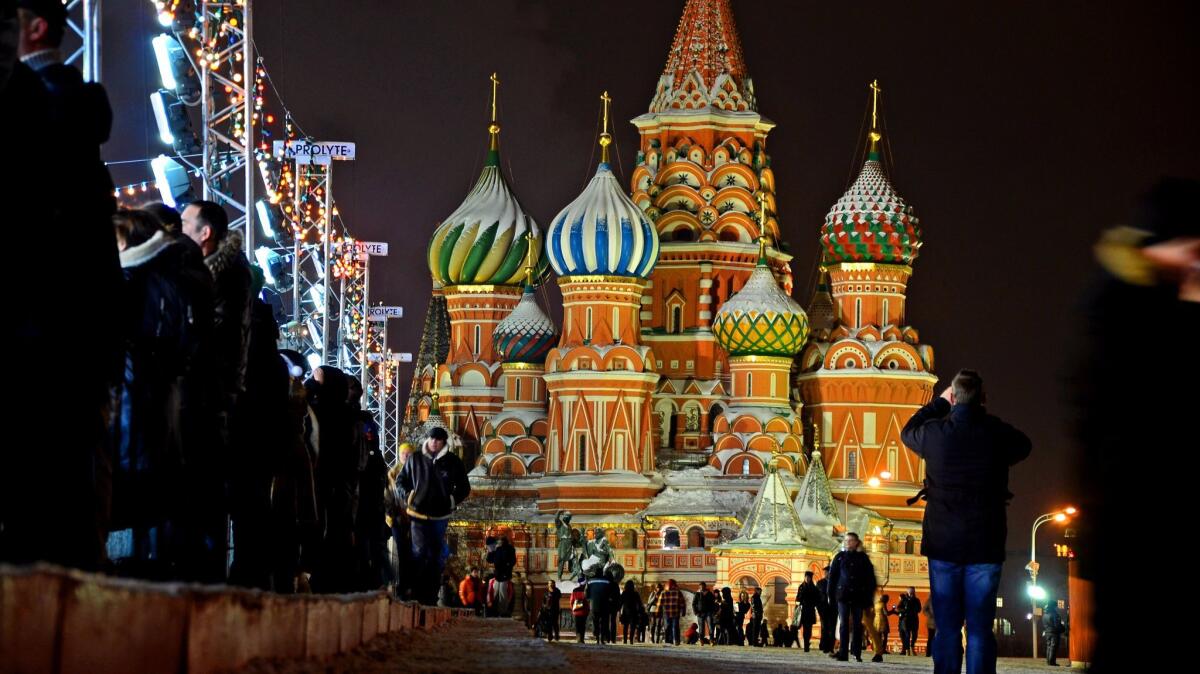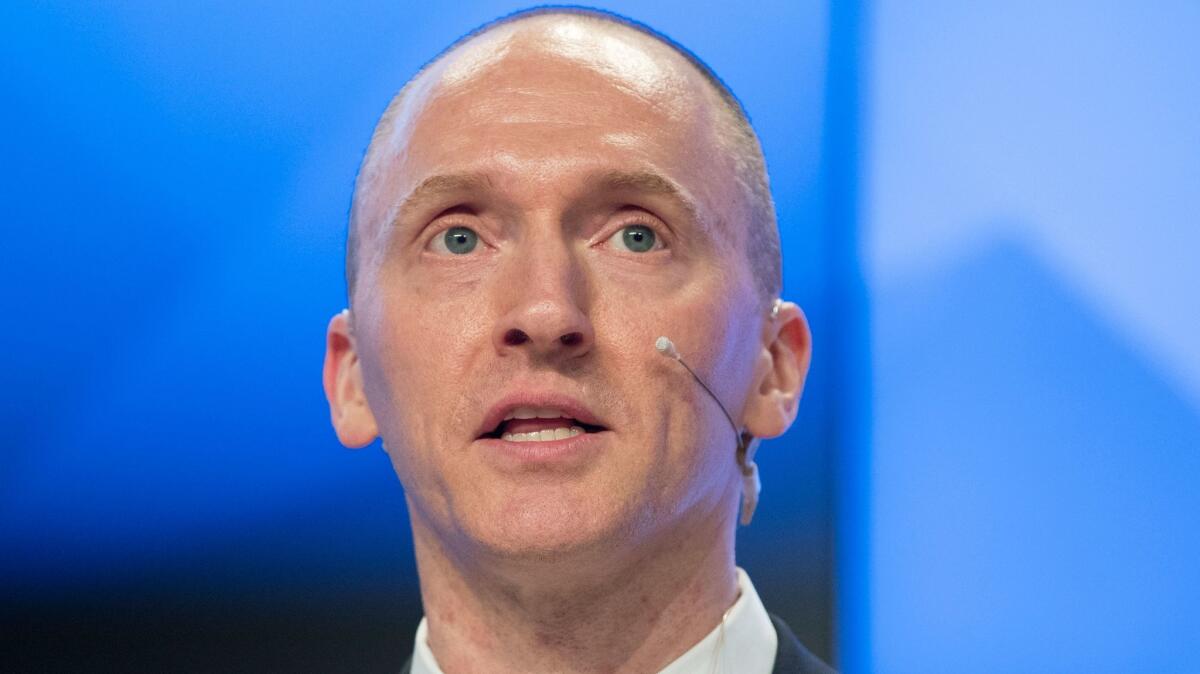Lots of smoke but no fire yet in U.S.-Russia investigation

Reporting from Washington — Roger Stone, a pugilistic Republican political operative who cut his teeth under President Nixon, didn’t attend Monday’s dramatic congressional hearing into Russia’s interference in the 2016 presidential race, but he played a starring role anyway.
Democrats took turns suggesting the Florida-based consultant and lobbyist could be a key figure in the FBI’s investigation of potential coordination between President Trump’s campaign and authorities in Russia, an inquiry that could overshadow the White House for months.
Stone, 64, says he isn’t concerned in the slightest.
“The hearing was the worst kind of demagoguery, red baiting, fearmongering and half-truths,” Stone, who sports a tattoo of a smiling Nixon on his back, said in a phone interview Tuesday. “Everything I did was perfectly innocent and legal.”
An expert in hard-edge political fighting, Stone demanded to go “toe-to-toe” with Rep. Adam B. Schiff (D-Burbank), the ranking member of the House Intelligence Committee, who had said it was “more than possible” that Stone and others had colluded with Moscow.
While the hearing produced the bombshell disclosure that the FBI is conducting a counterintelligence investigation aimed at some of Trump’s top lieutenants, potentially extending into the White House, it did not provide any evidence of wrongdoing.
But the marathon testimony by FBI Director James B. Comey and National Security Agency Director Michael S. Rogers, and the copious details that Democrats presented, cast a broad shadow of suspicion on Stone, who had served as an informal advisor to the Trump campaign, and others closer to Trump’s inner orbit.
Counterintelligence investigations are among the FBI’s most difficult, time-consuming and secretive, and Comey refused to say when or whether he would provide an update to Congress or conclude the inquiry. He also refused to answer questions about Stone or other potential FBI targets.
That left plenty of running room for Schiff and other Democrats to sketch a tangled web of circumstantial evidence and intrigue involving business deals, meetings, phone calls, travel and other links between Russian officials and Trump, members of his family and half a dozen current and former confidants.
Stone has known Trump for years, partly from a mutual friendship with Roy Cohn, who gained prominence as a top aide to Sen. Joseph McCarthy during the anti-Communist hunts of the 1950s and later worked as a lawyer for Trump in New York.
Like Trump, Stone is outspoken and given to spinning conspiracy theories. He landed in the Democrats’ cross-hairs partly due to his own boasts and tweets.
Last summer, he boasted that he had communicated directly with Julian Assange, the fugitive founder of WikiLeaks, and predicted that the secret-publishing website would soon disclose documents related to Democrat Hillary Clinton’s campaign.
WikiLeaks released thousands of emails pilfered from computer networks used by the Democratic National Committee. They embarrassed Democrats and served as a distraction for Clinton’s campaign.
Stone later appeared to foreshadow the release of emails stolen from the Gmail account of Clinton’s campaign chairman, John Podesta, by tweeting that “it will soon [be] Podesta’s time in the barrel.” His pilfered emails soon appeared online.
In the interview Tuesday, Stone said he did not speak directly with Assange but had communicated through a mutual friend who works as a reporter at a “mainstream” organization that he did not identify.
Stone said the friend told him that Assange has “everything devastating to Hillary.”
“When he says ‘everything,’ I assume that means the missing emails,” Stone added, referring to Clinton’s deletion of 30,000 emails that she said were personal in nature from a private email server that she used while she was secretary of State.
Stone denied knowing that Podesta’s emails were going to be released. He said he was referring to an article he was going to publish in coming months.
Assange has denied that WikiLeaks obtained the trove of stolen emails from Russia, but Comey testified Monday that Russian intelligence used a third party to covertly funnel the digital material to Assange’s website.
Other former Trump associates also came under Democrats’ scrutiny.

Drawing on an unverified dossier written by a former British intelligence officer, for example, Schiff cited a “secret” meeting between Carter Page, who served as a senior foreign policy advisor to the Trump campaign, and the chief executive of a Russian gas company who is close to Russian President Vladimir Putin and, like him, once worked for the Soviet-era KGB spy service.
On Tuesday, Page — who helps run a New York investment fund and consulting firm specializing in Russian and central Asian oil and gas business — sounded relieved that the hearing had produced nothing more substantial.
“I was highly encouraged by yesterday’s initial steps toward illuminating the truth surrounding what actually happened last year,” he said in a statement.
Schiff and others also focused on Paul Manafort, who once ran a political lobbying firm with Stone and was a top official in Trump’s campaign for five months last year, ultimately serving as campaign manager.
Manafort left the campaign in August after his name appeared on a ledger that indicated he had been paid millions of dollars by a pro-Russia political party in Ukraine, for which he had consulted for more than a decade.
On Tuesday, a Ukrainian lawmaker released financial documents allegedly showing that Manafort had used offshore accounts in Belize and Kyrgyzstan to launder the money.
The documents, if legitimate, stem from Manafort’s work for the party of former Ukrainian President Viktor Yanukovich, a Putin ally. He has been in hiding in Russia since being overthrown by pro-Western protesters in 2014, and is wanted in Ukraine on corruption charges.
Manafort could not be reached for comment Tuesday, but he has repeatedly denied any allegation that he accepted improper payments or had done anything improper in his work with Ukraine.
Another former Trump aide who came under repeated fire was Michael Flynn, a former head of the Defense Intelligence Agency who briefly served as Trump’s national security advisor.
Flynn was ousted last month after he acknowledged he had misled Vice President Mike Pence about multiple phone calls in December with Sergey Kislyak, Russia’s ambassador to the United States, about easing President Obama’s sanctions on Russia.
Schiff, through his spokesman, did not respond to requests for comment Tuesday. But at Monday’s hearing, he asked whether it was possible that “all these events and reports are completely unrelated, and nothing more than an entirely unhappy coincidence.”
“Yes, it is possible,” he continued. “But it is also possible, maybe more than possible, that they are not coincidental, not disconnected and not unrelated.”
ALSO: Some right-wing media sites under investigation for possible Russia ties »
[email protected] | Twitter: @davidcloudLAT
[email protected] | Twitter: @delwilber
ALSO
Gorsuch promises he would be independent on Supreme Court, including from President Trump
After a day of trying to close the deal, Trump remains short on healthcare votes
More to Read
Sign up for Essential California
The most important California stories and recommendations in your inbox every morning.
You may occasionally receive promotional content from the Los Angeles Times.












